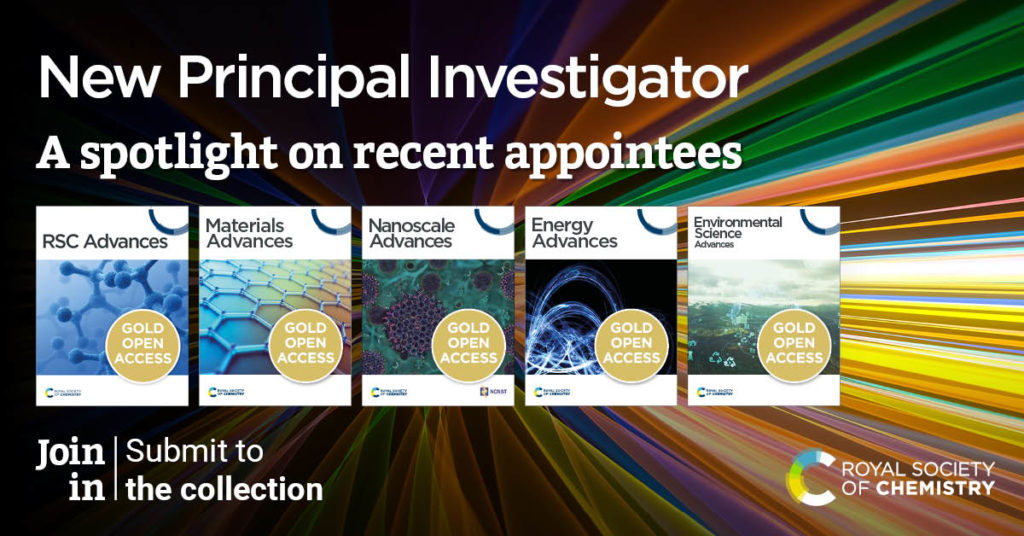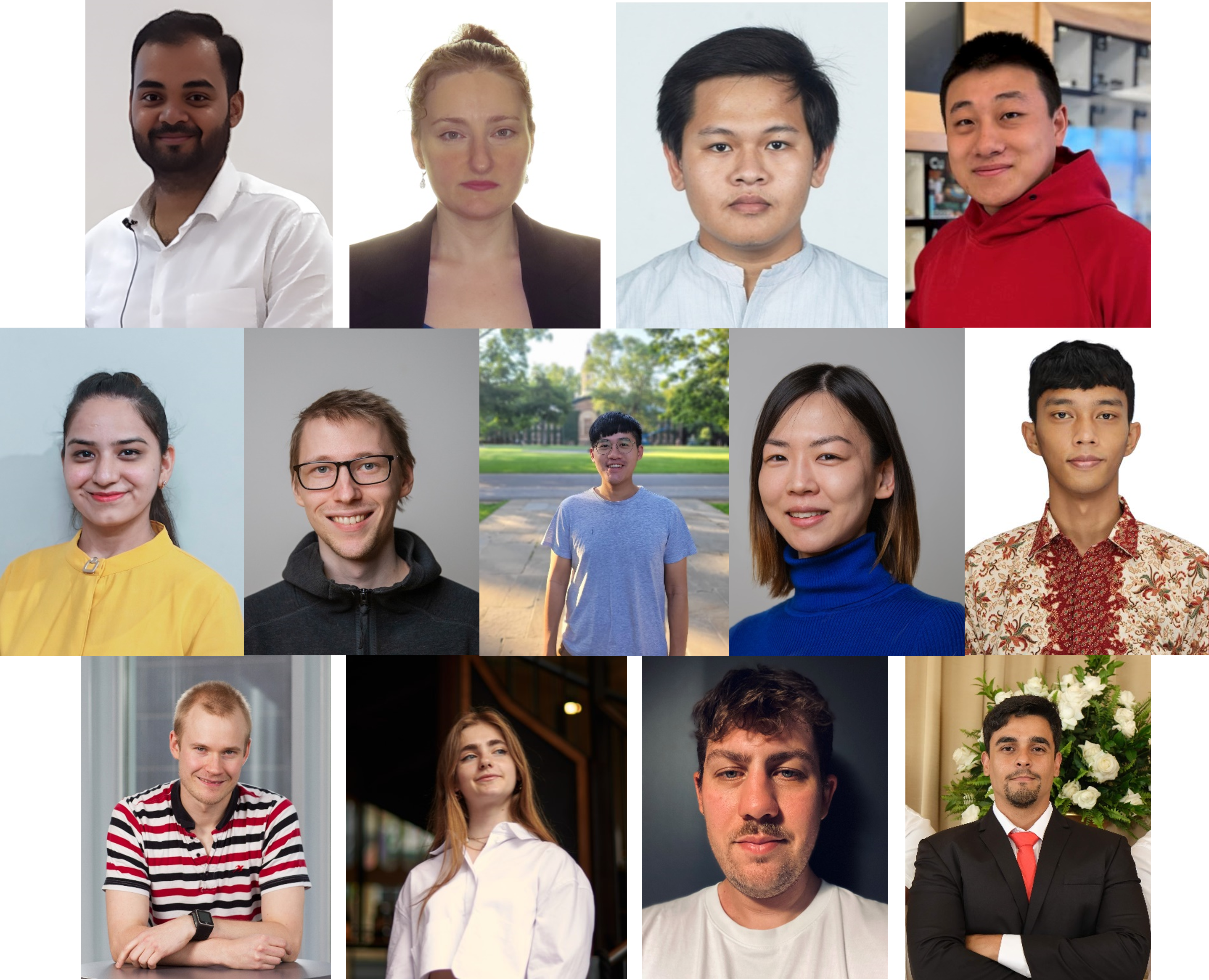We are delighted to present the 2023 edition of the RSC Advances Emerging Investigators series! Following the success of our 2022 edition, we are excited to continue highlighting the chemistry research being conducted by some of the leading investigators in our community.
This year’s Series Editors were Professor Shirley Nakagaki (Federal University of Paraná, Brazil) and Dr Fabienne Dumoulin (Acıbadem Mehmet Ali Aydınlar Universit, Türkiye). Eight articles were selected to support emerging researchers who are already making strides in their respective fields of research, both nationally and internationally. In this series, researchers address issues around water pollution, and develop analytical tools for the detection of biologically relevant substances. We also showcase efforts to prepare and characterize new compounds, as well as computational and theoretical research. Read all about the contributions in this accompanying Editorial.
We would like to take this opportunity to highlight an author from the series, Moses O. Alfred. We interviewed Moses to find out more about his area of research and his contribution to the series.

Distribution and toxicity of dihydroxybenzenes in drinking water sources in Nigeria
Oluwaferanmi B. Otitoju, Moses O. Alfred, Chidinma G. Olorunnisola, Francis T. Aderinola, Olumuyiwa O. Ogunlaja, Olumide D. Olukanni, Aemere Ogunlaja, Martins O. Omorogie and Emmanuel I. Unuabonah
RSC Adv., 2024,14, 982-994
Dr Moses O Alfred holds a Ph.D. in Industrial Chemistry and an MSc in Environmental and Analytical Chemistry from Redeemer’s University, Nigeria, building upon his foundational BSc in Industrial Chemistry from Adekunle Ajasin University. Throughout his academic journey, Dr Alfred has garnered prestigious scholarships, including The World Academy of Science Master’s Degree Scholarship, the African-German Network of Excellence in Sciences (AGNES) mobility grant, the TWAS-CNPq Sandwich Ph.D. Fellowship and, recently, the Alexander von Humboldt Georg Forster Postdoctoral Fellowship showcasing his exceptional dedication to advancing environmental science. Renowned for his groundbreaking research in the investigation of water quality issues, water purification, and pollution control, Dr. Alfred’s innovative work not only surveys water pollution but also focuses on developing low-cost materials from waste matter to remove toxic contaminants from water sources. His contributions, including novel adsorbents and photocatalytic materials, have earned him international recognition and invitations to present at esteemed conferences and workshops. As an educator, Dr Alfred mentors and supervises students at Redeemer’s University and the African Centre of Excellence for Water and Environmental Research (ACEWATER), shaping the next generation of environmental scientists. Driven by his passion for environmental sustainability, Dr. Alfred’s research, peer review activities, and commitment to mentorship continue to leave a lasting impact on the field, inspiring future scientists.
1. Could you briefly explain the focus of your article to the non-specialist (in one or two sentences only) and why it is of current interest?
With urbanization, industrialization, and population growth exacerbating pollution levels globally, there’s a critical need to assess the distribution and toxicity of these compounds, especially considering their potential adverse effects on both aquatic ecosystems and human health. Our study addresses the pressing issue of water pollution caused by dihydrobenzene compounds, particularly Catechol (CAT) and Hydroquinone (HQ), in drinking water sources across Nigeria. Moreover there are several reports on the removal of these contaminants in water but to the best of our knowledge ours is the first report of their distribution in water.
2. How big an impact could your results potentially have?
The findings of our study could have far-reaching implications for public health and environmental management in Nigeria and beyond. Being the first reporting the presence of these contaminants despite several reports on their removal, it would serve as a basis for understanding their public health impact and provide evidence for their proper management aside the existing theoretical assumptions. By shedding light on the presence and toxicity of CAT and HQ in drinking water sources, policymakers and health authorities can develop targeted mitigation strategies to safeguard water quality and protect vulnerable populations from harmful exposure.
3. Could you explain the motivation behind this study?
Our research was motivated by the alarming lack of data on the occurrence and risks associated with CAT and HQ in water bodies, particularly in West Africa. Given the widespread use of these compounds in pharmaceuticals and personal care products, coupled with their persistence in the environment, we sought to fill this knowledge gap and raise awareness of the potential health hazards posed by waterborne pollutants.
4. In your opinion, what are the key design considerations for your study?
Critical design considerations for our study included selecting representative sampling sites across different states in Nigeria, considering variations in land use and industrial activities. Additionally, accounting for seasonal variations allowed us to capture potential fluctuations in contaminant levels and assess their impact on water quality. Additionally, ensuring robust analytical methods and statistical analyses were essential for accurately assessing the distribution and toxicity of CAT and HQ.
5. Which part of the work towards this paper proved to be most challenging?
Obtaining comprehensive data over the 12-month sampling period proved to be particularly challenging, given the dynamic nature of water sources and the complexity of pollutant transport mechanisms. Addressing these challenges required meticulous planning and execution, as well as robust analytical methods to ensure the reliability of our findings. In addition, it was quite challenging finding a basis to compare our results because of the dearth of information on the occurrence and distribution of these contaminants in water
6. What aspect of your work are you most excited about at the moment?
We are particularly excited about the potential of our research to inform evidence-based decision-making and drive positive change in water resource management practices. By highlighting the risks posed by CAT and HQ contamination, we aim to catalyze efforts to enhance water quality monitoring and implement effective pollution control measures. Additionally, the opportunity to contribute novel data on emerging pollutants in understudied regions like West Africa is both rewarding and impactful.
7. How has your research evolved from your first article to this particular article?
Our research has evolved significantly from our initial hypotheses, driven by emerging data and insights gained throughout the study process. While our previous work laid the groundwork for investigating water quality issues in the region, especially pharmaceutical and personal care products such as parabens, antibiotics, phenolic compounds, etc, this current article represents a more focused and comprehensive analysis of specific underreported pollutants and their implications. With each article, we have refined our methodologies, expanded our scope of analysis, and deepened our understanding of the complex dynamics driving water quality degradation.
8. What is the next step? What work is planned?
Moving forward, our research aims to expand the scope of our investigations to include additional, pollutants, regions, water sources, and environmental matrix, further elucidating the distribution and toxicity of CAT, HQ and several other pharmaceutical and personal care products in water and other environmental matrices. Additionally, we plan to collaborate with local authorities and stakeholders to implement targeted mitigation strategies, enhance water quality monitoring efforts and evidence based policy formulation for these class of emerging contaminants.
9. Why did you want to publish in RSC Advances?
We chose to publish our research in RSC Advances due to its reputation for publishing high-quality, impactful research across a wide range of scientific disciplines. The journal’s broad readership and open-access model align with our goal of disseminating our findings widely and facilitating broader engagement with our research outcomes.
10. What are your thoughts on open access publishing?
We strongly support open-access publishing as it promotes accessibility and transparency in scientific research, allowing researchers, policymakers, and the public to access and engage with important findings without barriers. By making our research freely available, we hope to maximize its impact and contribute to evidence-based decision-making in public health and environmental management.

Submit to RSC Advances today! Check out our author guidelines for information on our article types or find out more about the advantages of publishing in a Royal Society of Chemistry journal.
Keep up to date with our latest Popular Advances articles, Reviews, Collections & more by following us on Twitter. You can also keep informed by signing up to our E-Alerts.
Comments Off on Emerging Investigators Series 2023 – Author Spotlight – Moses O. Alfred





















